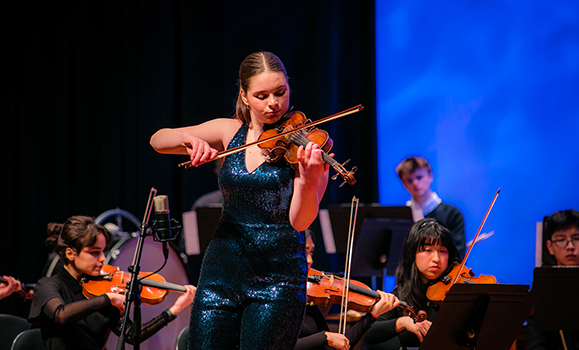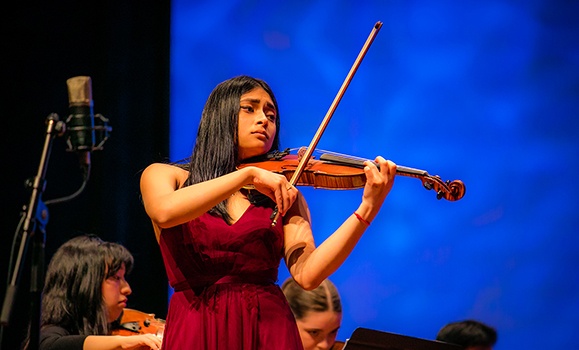About the author: Jacob Caines is director of the ║┌┴¤│ď╣¤═°Wind Ensemble as well as a faculty member and musicianship coordinator in the Fountain School of Performing Arts.
As Victoria Dubois, a flutist in the ║┌┴¤│ď╣¤═°Symphony Orchestra puts it, ÔÇťMusic has the ability to evoke emotion and inspire meaningful conversations.ÔÇŁ For hundreds of years, orchestral music has told complex and complicated stories through pitch, timbre, and rhythm rather than words or images.┬á
During the orchestraÔÇÖs December 5 concert, the ensemble will tell stories of fictional characters from the 1780s, true accounts of the first Black woman to become a recognized and celebrated composer, and provide a sombre reflection on a life ended too soon.┬á
Dr. Leonardo Perez, conductor of the orchestra, will begin by leading the group through BeethovenÔÇÖs Egmont Overture. The overture is a small section, albeit the most famous, of the music Beethoven wrote for GoetheÔÇÖs play Egmont. The overture music heralds the arrival of the heroic Count Egmont before the eventual treachery of his people and death sentence.┬á
The meandering and unresolved opening measures of the overture betray how we should feel about the title character despite the interjection of broad and confident chords. 
To bookend the evening, the orchestra will finish the night with the orchestral classic, Dvorak Symphony 8. The four movements of this work represent some of the most beautiful moments in DvorakÔÇÖs repertoire.┬á
Drawing on stories of fictional characters and real people alike, violinist Caroline Boulter describes playing in an orchestra act of human celebration. 
ÔÇťWe are relating the human experience through music and sound whether it comes from a more traditional classical period or the current period,ÔÇŁ says Caroline, pictured below.┬á

In addition to the Egmont overture, the orchestra is also performing a string ensemble feature by Florence Price, who was one of the first Black women composers to gain international recognition.
From anger to hope
My Name is Amanda Todd tells a very different story. Written by Canadian Composer Jocelyn Morlock in 2016, the work asks the audience and players to experience the life, tragedy, heartbreak, and inspiration of Amanda Todd, a 15-year-old from Port Coquitlam. After years of cyber abuse and sexual exploitation, Amanda Todd took her own life. 
Morlock used the sounds of the orchestra to tell AmandaÔÇÖs story and rather than focus on anger or fear, chose to focus on hope and inspiration. The work is not resigned or quiet, nor is it a memorial. Morlock chose to tell a story of hope and inspiration.┬á
In the final moments of the piece only a handful of musicians are playing, but they are resolute, not small, or meek. 
At the time of the premiere, Jocelyn Morlock told audiences that ÔÇťwhen she [Amanda] spoke up for herself on social media, it was the start of positive changeÔÇŽpeople taking personal responsibility for what they do online.ÔÇŁ
Shanti Sivarulrasa is a violinist with the orchestra and reflects on the program: ÔÇťBy expressing her story through music, her experience becomes immortalized. Every time it's performed, we are reminded of her story and encouraged to reflect on the past, present, and future. It is essential for us to continue to express these complex stories through music to share her experience and to remind ourselves and others of her story.ÔÇŁ┬á
Join the orchestra and experience these stories on December 5 at 7:30 p.m. in the Joseph Strug Concert Hall.

